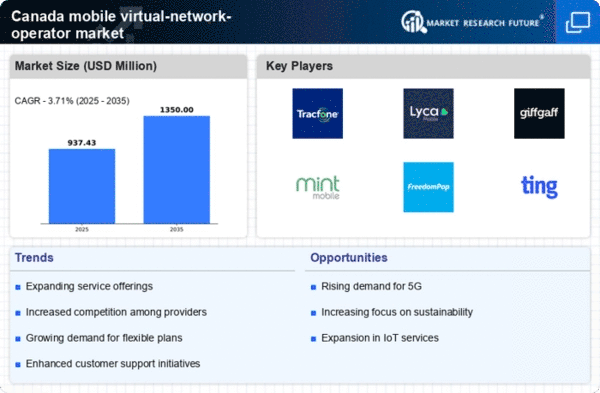Niche Market Targeting
The mobile virtual-network-operator market is increasingly characterized by niche market targeting. MVNOs are identifying specific consumer segments, such as students, seniors, or international travelers, and tailoring their services accordingly. This strategy allows them to differentiate themselves from traditional carriers and capture market share. For instance, some MVNOs in Canada focus on providing low-cost international calling plans, appealing to the large immigrant population. By addressing the unique needs of these segments, MVNOs can foster customer loyalty and enhance their market presence. This targeted approach is a significant driver for the mobile virtual-network-operator market, as it enables operators to create specialized offerings that resonate with specific consumer demographics.
Enhanced Customer Experience
In the competitive landscape of the mobile virtual-network-operator market, enhancing customer experience has emerged as a crucial driver. MVNOs are increasingly focusing on customer service, user-friendly interfaces, and personalized offerings to attract and retain subscribers. With a growing emphasis on customer satisfaction, many MVNOs are implementing advanced customer relationship management systems to streamline interactions. Data suggests that companies prioritizing customer experience can see a retention increase of up to 15%. This focus on customer-centric strategies is reshaping the mobile virtual-network-operator market, as operators strive to build long-term relationships with their users, ultimately leading to increased market share and profitability.
Rising Mobile Data Consumption
The mobile virtual-network-operator market in Canada is experiencing a surge in mobile data consumption, driven by the increasing reliance on smartphones and mobile applications. As consumers demand more data for streaming, gaming, and social media, MVNOs are adapting their offerings to meet these needs. Reports indicate that mobile data traffic in Canada is projected to grow by over 30% annually, compelling MVNOs to enhance their data plans. This trend not only attracts new customers but also encourages existing users to upgrade their services, thereby expanding the overall market. The rising mobile data consumption is a critical driver for the mobile virtual-network-operator market, as it pushes operators to innovate and provide competitive pricing structures to retain and attract users.
Cost-Effective Service Offerings
Cost efficiency remains a pivotal driver in the mobile virtual-network-operator market. MVNOs typically operate with lower overhead costs compared to traditional carriers, allowing them to offer competitive pricing. In Canada, where the average mobile plan costs around $75, MVNOs are providing alternatives that can be as much as 20% cheaper. This price sensitivity among consumers, particularly in a market where affordability is paramount, drives the growth of MVNOs. By leveraging wholesale agreements with major carriers, these operators can provide attractive packages that appeal to budget-conscious consumers. The emphasis on cost-effective service offerings is reshaping the competitive landscape of the mobile virtual-network-operator market, making it an essential factor for growth.
Partnerships with Content Providers
Strategic partnerships with content providers are becoming a vital driver in the mobile virtual-network-operator market. By collaborating with streaming services, gaming platforms, and social media applications, MVNOs can offer bundled services that enhance their value proposition. In Canada, partnerships with popular content providers can lead to increased subscriber acquisition, as consumers are drawn to plans that include exclusive access to content. This trend not only differentiates MVNOs from traditional carriers but also creates additional revenue streams through co-marketing initiatives. The integration of content offerings is likely to play a significant role in shaping the future of the mobile virtual-network-operator market, as operators seek to leverage these partnerships to enhance their competitive edge.
















